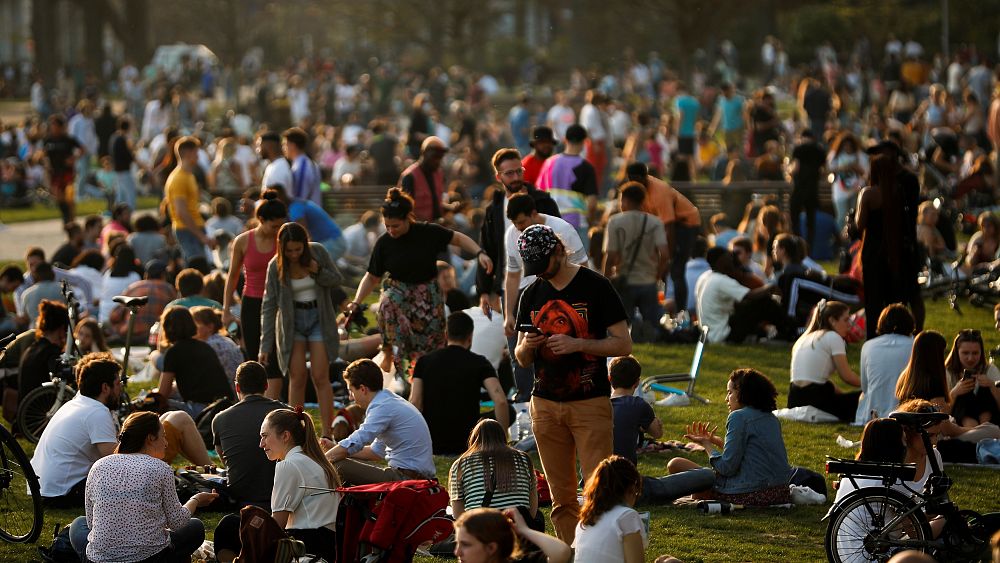Belgium’s prime minister has announced the country will reopen restaurants and bars for outdoor service next month, and lift a night-time curfew.
The decision comes as COVID-19 cases continue to decrease.
And other countries, including Switzerland and Denmark, also announced on Wednesday relaxation of measures was incoming.
Belgium
Belgian prime minister Alexander De Croo made the announcement at a news conference in Brussels following a seven-hour meeting with regional leaders who struggled to find a compromise.
“We saw that the number of infections has clearly decreased during the last weeks, we saw that the reproduction rate is under one, and we see that the hospitalization rate starts to decrease too,” De Croo said.
Bars and restaurants have been shut down since mid-October because of the pandemic but their owners have been lobbying to reopen and protesting in recent weeks.
Barring a new surge in cases, De Croo said they will be authorised to reopen their terraces from May 8, but customers won’t be served indoors.
De Croo said ministers would launch, along with local authorities, “the possibility to start scientific experiments and test projects, in order to find the best and the safest way to organise events”.
“One cannot be blind in front of the situation that is facing health care services, but one cannot be deaf when people are asking for prospects,” De Croo said.
De Croo also said he hopes on May 8 two people from the same household will be able to socialise inside.
The number of new coronavirus infections has dropped 19% over the past seven days and De Croo said a peak might have been reached. But the situation in hospitals remains critical.
Belgium will also lift a ban on non-essential travel abroad from next week, but the government continues to advise against such trips.
After a three-week shutdown that covered the Easter holidays, schools will open again next Monday, but some classes will be organised remotely.
Non-essential shop owners will be allowed to welcome customers without appointments from April 26, when hair salons and tattoo shops can reopen.
Tests will also be conducted in order to find possible solutions to organize outdoor events over the summer.
A further easing of lockdown is expected in June when a large majority of people aged over 65 will have been vaccinated.
Switzerland
Switzerland also announced it was easing measures – despite the fact the pandemic is getting worse in the country.
From 19 April, “it will again be possible to organise events open to the public”, indoor sports and cultural activities will be permitted and restaurants will be able to reopen their terraces, the Federal Council said in a statement, following a broad campaign by the sectors most affected by the pandemic to reopen the economy.
The daily infection rate is roughly equivalent to that in Italy and Germany, but is below the EU average and three times lower than in France.
“The epidemiological situation remains fragile and has even deteriorated in recent weeks,” notes the Council, which also acknowledges that it is still too early to measure the exact impact of the Easter holidays on the dynamics of the pandemic in the Alpine country.
“Despite this situation, the Federal Council believes that the conditions allow for a moderate relaxation,” the statement said.
Alain Berset, the Health Minister, said that it was the responsible attitude of the vast majority of Swiss people that allowed the gradual reopening of the market.
“We have been able to keep the pandemic under control,” said the federal councillor, who noted that the very partial reopenings decided in March “have not caused a massive increase in infections”, allowing the movement to continue.
The government believes that the vaccination campaign is progressing well – almost half of the over-80s and around 30% of the 70-79s are fully vaccinated – and moreover the increase in hospital admissions “remains relatively low” and the occupancy rate of intensive care units stable.
Switzerland has one of the highest rates of complete vaccination in Europe.
Denmark
Denmark will gradually relax rules on travelling abroad, aiming to allow European travellers to move around without quarantine from the end of June.
Adopted by a near-majority of the parties in parliament, the plan provides for four stages between 21 April and the end of June, with the gradual lifting of compulsory quarantine depending on the destination. However, a negative test remains a prerequisite for entry into the country.
It depends in part on the progress of the vaccination campaign, currently slowed down by the halting of the use of the AstraZeneca vaccine, and on the introduction of the European health passport, scheduled for around 26 June.
“The introduction of corona passports in the EU will make it possible to organise summer holidays in Europe and to receive summer tourists in Denmark, provided that you can present documents proving that you have either tested negative, been vaccinated or have already been ill,” the agreement said.
After a semi-containment between Christmas and early March, Denmark, where the virus circulation is now moderate, is gradually reopening with the deployment of a national “coronapass”.
Available via a secure application as well as in paper format, it currently allows people to enter certain small businesses – hairdressers, beauty salons or driving schools – by proving that the bearer is either fully vaccinated, or has already contracted COVID-19 with a positive test from two to twelve weeks ago, or has tested negative for less than 72 hours before.
In addition to the reopening, which will soon allow Danes to return to the terraces, cinemas and museums, travel abroad is now possible again.
Source link




